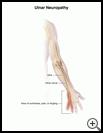
Ulnar Neuropathy
________________________________________________________________________
KEY POINTS
- Ulnar neuropathy is a nerve problem that causes numbness, tingling, or pain in your arm, hand, wrist, or little finger.
- Treatment may include wearing a splint or tape to keep your wrist from moving, padded gloves, or stretching and strengthening exercises.
________________________________________________________________________
What is ulnar neuropathy?
Ulnar neuropathy is a nerve problem that causes numbness, tingling, or pain in your arm, hand, wrist, or little finger.
This condition is also called handlebar palsy.
What is the cause?
The pain and other symptoms are caused by irritation of the ulnar nerve. This nerve is in your arm and goes from your neck to your ring finger and little finger. Some of the things that can irritate the ulnar nerve are:
- Repeat movements of the wrist from activities like hammering, throwing, using a computer mouse or keyboard, or painting
- An elbow injury
- Stretching of the nerve, like when you hold the lower position of a drop handlebar when you ride a bike
What are the symptoms?
Symptoms may include:
- Numbness
- Tingling
- Pain in the forearm or hand on the side of the little finger
- Weakness in your hand
How is it diagnosed?
Your healthcare provider will ask about your symptoms, activities, and medical history and examine you. Your provider may refer you to a specialist for tests to check your nerves.
How is it treated?
It’s important to try to find what caused the problem and figure out what you need to do differently. For example if it is caused by bicycling, it may help to wear padded gloves. You might also try changing how you hold the handlebar, like move your grip from the top of the handlebar to the sides of the handlebar.
Your healthcare provider may recommend stretching and strengthening exercises and other types of physical therapy to help you heal.
A splint or tape that keeps your wrist from moving may help. Ask your provider about this.
How can I help take care of myself?
- Take nonprescription pain medicine, such as acetaminophen, ibuprofen, or naproxen. Read the label and take as directed. Unless recommended by your healthcare provider, you should not take these medicines for more than 10 days.
- Nonsteroidal anti-inflammatory medicines (NSAIDs), such as ibuprofen, naproxen, and aspirin, may cause stomach bleeding and other problems. These risks increase with age.
- Acetaminophen may cause liver damage or other problems. Unless recommended by your provider, don't take more than 3000 milligrams (mg) in 24 hours. To make sure you don’t take too much, check other medicines you take to see if they also contain acetaminophen. Ask your provider if you need to avoid drinking alcohol while taking this medicine.
Follow your healthcare provider's instructions, including any exercises recommended by your provider. Ask your provider:
- How and when you will get your test results
- How long it will take to recover
- If there are activities you should avoid and when you can return to your normal activities
- How to take care of yourself at home
- What symptoms or problems you should watch for and what to do if you have them
Make sure you know when you should come back for a checkup. Keep all appointments for provider visits or tests.
How can I help prevent ulnar neuropathy?
Here are some of the things you can do to help prevent ulnar neuropathy:
- Try to stop doing activities that involve repeat movements that irritate your ulnar nerve.
- When you ride a bike, change your hand position on the handlebar often.
- Do hand and wrist stretches before activities.

